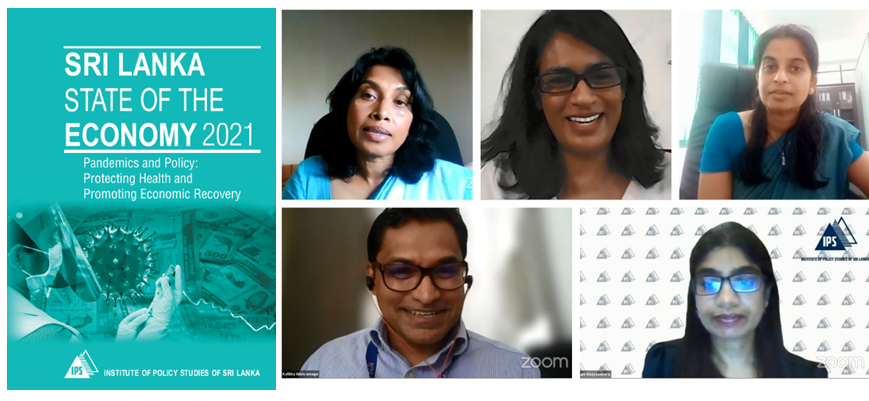October, 18, 2021

IPS’ ‘Sri Lanka: State of the Economy 2021’ Second Report Launch Webinar
The second of IPS’ three-part webinar series to launch the ‘Sri Lanka: State of the Economy 2021’ report on the topic ‘Pandemics and Disruptions: Safeguarding Lives and Livelihoods of Sri Lankans’ was held via Zoom on October 13, 2021. It featured presentations by Dr Nisha Arunatilake and Dr Bilesha Weeraratne from the IPS with expert insights from Ms Madhavie Gunawardena, Director, TRCSL and former Commissioner of the Department of Labour, and Dr Kolitha Wickramage, Global Migration Health Research and Epidemiology Coordinator, Migration Health Division, International Organization for Migration (IOM). Ashani Abayasekera from IPS moderated the discussion.
Dr Arunatilake stated that the unemployment rate increased by 0.7% in 2020. The most affected were youth, low and medium-skilled individuals, and males, while several women left the labour market altogether. The quality of jobs available declined too with many workers taking on more vulnerable forms of employment (eg. agriculture, self-employment) that have low social security. IPS research shows that the perception of employees, employers, and trade union leaders is that the government could have done better by providing financial support through the EPF/ETF. However, no such legal provisions exist.
She pointed out that the COVID-19 crisis has highlighted the need for pre-retirement social security benefits such as sickness benefits and unemployment assistance and that the funds allocated for ETF is sufficient to cover pre-retirement benefits that can be given to workers. She explained the government must improve and expand access to social security for employees and firms, support firms to offer flexible work arrangements for higher labour participation and develop better labour market institutions that are prepared to address disaster risks.
Dr Arunatilake said that education has also been heavily affected due to COVID-19. The average number of days of school closure has exceeded the averages of other countries. The shift to distance education (online and TV) was not entirely successful, with many inequities. Less than 50% of students were reached online overall, and only 30% of students were reached via both methods, compared to over 80% in the largest schools. To put education on the path to recovery, learning losses should be assessed with an adjustment to the curricula. Additionally, investing in technology and relevant teacher training should be promoted, along with formulating blended methods to deliver education and cover the gaps.
Dr Bilesha Weeraratne’s presentation focused on migration and health. Many migrants returned to Sri Lanka during the pandemic. Yet remittances still grew by 5.8% in 2020 but have been declining since the beginning of 2021. Despite having a Return and Repatriation sub policy, it was not implemented during the crisis. On average, there was a 4.5-month delay between the decision to return and the actual date of return. This was also because of the lack of proper information.
Moreover, most of the returnees bore the cost of returning themselves. Returning migrant workers require economic, social and psychosocial reintegration support but reintegration support was largely limited to immediate health support (testing, quarantine, treatment).
On health, Dr Weeraratne noted that many migrants prefer traditional medicine (TM) to western medicine (WM) but the traditional medicine sector needs to be regulated. Sri Lanka needs to improve regulations and supervision for TM, integrate TM and WM, improve local manufacturing of pharmaceuticals and medical equipment, introduce a robust laboratory strategy and expand digital healthcare resources.
Ms Madhavie Gunawardena reflected that accommodating flexible working conditions through work from home (WFH) practices is important, especially for women as this allows them to balance their family and work responsibilities, thus retaining them in the labour force. Commenting on the problems in education delivery, Ms Gunawardena noted that even though technological initiatives can plug the learning gaps, there is currently no way of improving the students’ soft skills as extra-curricular and co-curricular activities were halted. This will further affect their employability in the future.
Dr Kolitha Wickramage said that understanding the gendered dimensions and location of returning migrant workers helps policymakers understand what resources should be allocated for reintegration support. He also commended the IPS report for recognising the importance of addressing psychosocial issues of migrants, in addition to economic and social issues.
The full discussion can be watched on our Facebook page and YouTube channel.
The full discussion can be watched on IPS’ Facebook page and YouTube channel.
YouTube: https://bit.ly/3p5OOoS
Video Story